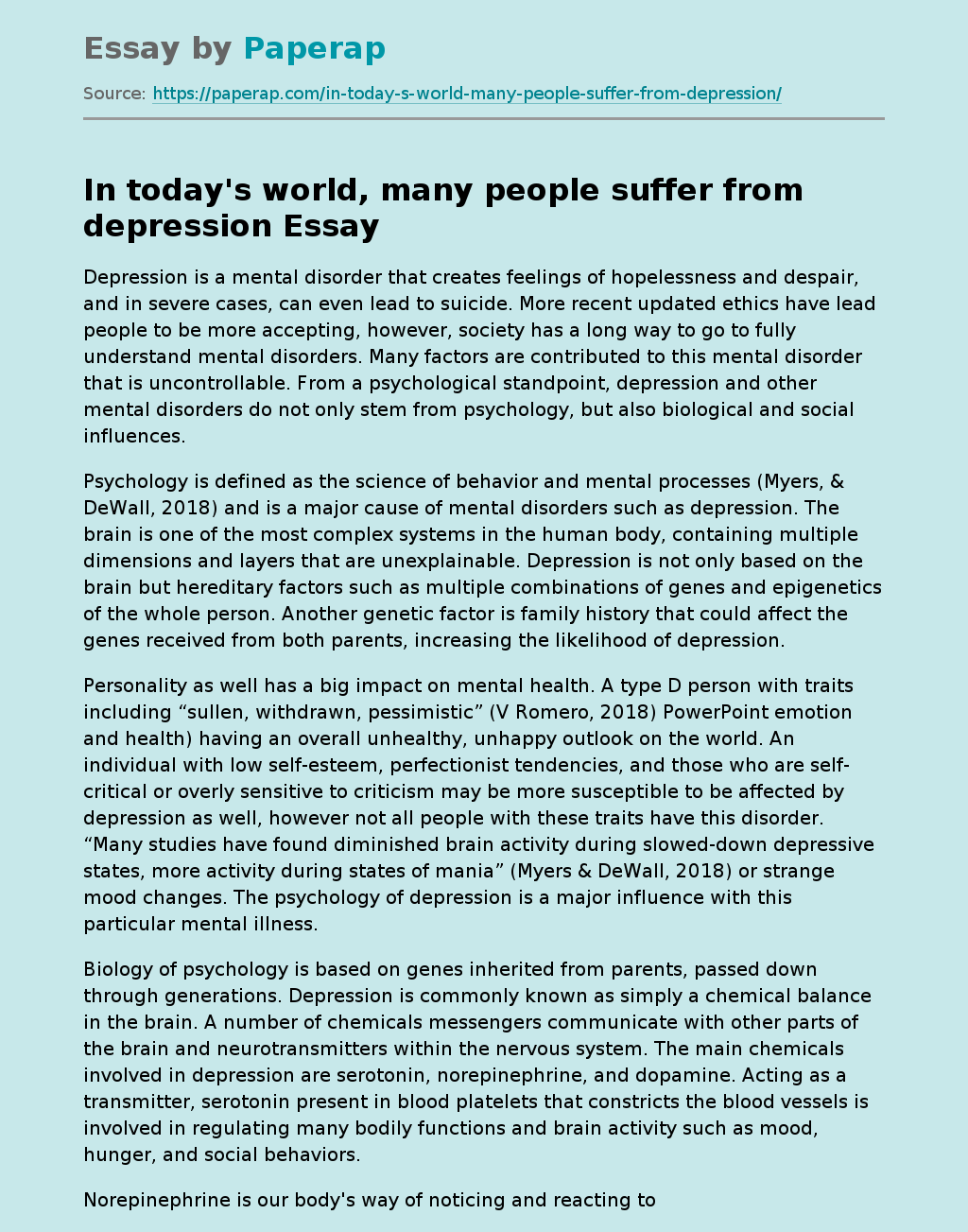In today's world, many people suffer from depression
Depression is a mental disorder that creates feelings of hopelessness and despair, and in severe cases, can even lead to suicide. More recent updated ethics have lead people to be more accepting, however, society has a long way to go to fully understand mental disorders. Many factors are contributed to this mental disorder that is uncontrollable. From a psychological standpoint, depression and other mental disorders do not only stem from psychology, but also biological and social influences.
Psychology is defined as the science of behavior and mental processes (Myers, & DeWall, 2018) and is a major cause of mental disorders such as depression.
The brain is one of the most complex systems in the human body, containing multiple dimensions and layers that are unexplainable. Depression is not only based on the brain but hereditary factors such as multiple combinations of genes and epigenetics of the whole person. Another genetic factor is family history that could affect the genes received from both parents, increasing the likelihood of depression.
Personality as well has a big impact on mental health. A type D person with traits including “sullen, withdrawn, pessimistic” (V Romero, 2018) PowerPoint emotion and health) having an overall unhealthy, unhappy outlook on the world. An individual with low self-esteem, perfectionist tendencies, and those who are self-critical or overly sensitive to criticism may be more susceptible to be affected by depression as well, however not all people with these traits have this disorder. “Many studies have found diminished brain activity during slowed-down depressive states, more activity during states of mania” (Myers & DeWall, 2018) or strange mood changes.
The psychology of depression is a major influence with this particular mental illness.
Biology of psychology is based on genes inherited from parents, passed down through generations. Depression is commonly known as simply a chemical balance in the brain. A number of chemicals messengers communicate with other parts of the brain and neurotransmitters within the nervous system. The main chemicals involved in depression are serotonin, norepinephrine, and dopamine. Acting as a transmitter, serotonin present in blood platelets that constricts the blood vessels is involved in regulating many bodily functions and brain activity such as mood, hunger, and social behaviors.
Norepinephrine is our body’s way of noticing and reacting to stressful situations. However, “people who have experienced multiple depressive episodes have fewer norepinephrinergic neurons than people who have no depressive history” (Nemade, n.d.). Lastly, Dopamine plays a major role in benefit and reward transmitters which gives the body the ability to attain pleasure. Depression can be hard to determine due to the lack of the ability to measure neurotransmitters in one’s brain activity. Genetics and brain neurons are a major factor in depression, however, components of both biological and psychological combine are key to understanding this mental illness. Another important factor in grasping the whole concept of depression is the social factors.
Social aspects of depression can create feeling of loneliness, stress, anxiety or depression which can lead to suicidal thoughts and actions. Many factor can be incorporated into feeling depression such as social media. However, this is not in all cases saying “if one uses social media often they will be depressed” but is a contributor to a person who may be depressed. According to Caroline Miller (2017), teenage and young adult users who spend the most time on Instagram, Facebook, and other platforms were shown to have a substantially (from 13 to 66 percent) higher rate of reported depression than those who spent the least time”.
The main draw of social media is to show other people what good things are happening in your life, creating envy and desire to be in others’ shoes. Along with social media, the “American” stereotype plays a big role in self-appearance and overall self worth. From a young age girls are told how to dress, how to where their hair, and how to act in public while men are being told to suppress their emotions and to look presentable at all times. The gender stereotyping for a growing child’s mind and self-esteem is toxic and constantly makes kids compare their lives to other peoples creating a diversion and lust for what other people look like and have. Certain relationships also contribute to the social elements of depression. An unhealthy relationship between family members or significant others can lead to feelings of stress or anxiety, which could ultimately lead to depression. Social components are critical to the perception and understanding of depression and other mental disorders.
Depression is a complicated mental disorder that is dependent on not only psychology but biology and social variables. “The severity and frequency of symptoms, and how long they last, will vary depending on the individual and his or her particular illness” (NIH, n.d) and possible age and gender. Psychologically of the mental disorder is seen from a personality standpoint while the biological comes from genetics and brain neurons whereas socially the disorder derives from relationships and social status.
In today's world, many people suffer from depression. (2021, Dec 05). Retrieved from https://paperap.com/in-today-s-world-many-people-suffer-from-depression/

